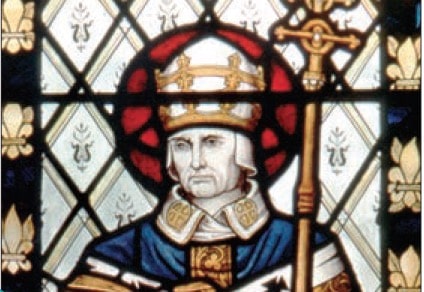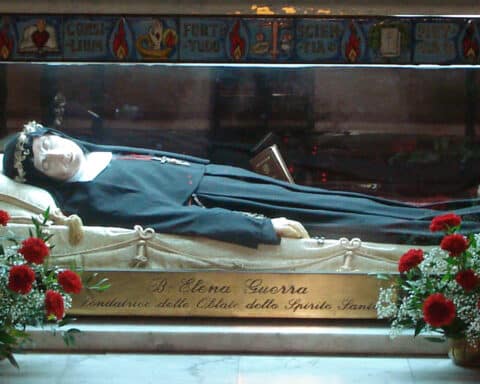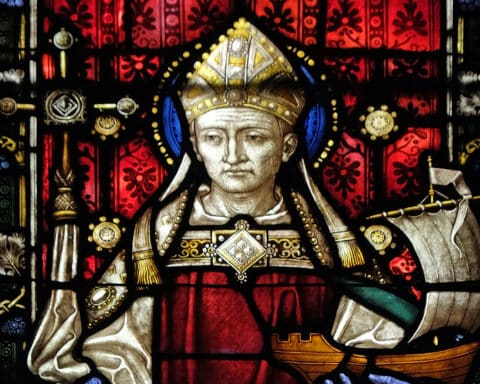The Year of Mercy promulgated by Pope Francis comes to a close on the feast of Christ the King (Nov. 20). The original announcement was made last year during a homily at a penance service presided over by the pope, who said, “No one can be excluded from the mercy of God.” Throughout the year, Our Sunday Visitor has provided a monthly profile of an icon of mercy: a man or woman who has manifested divine mercy in his or her life. It seems appropriate to end these reflections with the story of another pope identified with mercy: St. Callistus I who, according to the best records extant, led the Church from circa A.D. 218 to 223.
Bearing wrongs patiently
Like Pope Francis, Pope Callistus wanted to highlight God’s mercy. Both popes also received angry reactions from people who wanted to stress God’s justice or who thought being merciful was simply a way to water down Church teachings. Often the antagonists can be seen to be skewing the words of the popes, something that is quite easy to do in the case of Pope Francis, whose messages are ubiquitous in the media. In the case of Pope Callistus, there are no original documents extant. All we have is a list of Roman martyrs that gives us a good idea of the year of his death (c. 223), and a screed entitled “Philosophumena” in which the author, Hippolytus, hurls calumnies at Callistus. The reason for Hippolytus’ hostility seems to be politics rather than any wrongdoing by Callistus. Hippolytus wanted to be pope, so when Callistus was elected, Hippolytus set himself up as a rival bishop of Rome, thus becoming the Church’s first anti-pope.
A lot of what Hippolytus wrote about Callistus smacks of prejudice and the twisting of facts to produce a desired meaning. He notes that as a young man Callistus was a slave of Carpophorus, a member of the imperial household. Carpophorus entrusted to Callistus the management of a bank, which failed. Callistus was blamed and sentenced to hard labor, and the suggestion is made that he was not a Christian. Hippolytus gives no reason for the bank failure and no evidence of Callistus’ creed or lack thereof. Yet, Hippolytus does report that a group of Christians appealed for and obtained Callistus’ release, and that even Pope St. Victor obtained another liberation for Callistus when he was arrested a second time (under related but suspicious circumstances). Moreover, Hippolytus says that Pope Victor secured a pension for Callistus. Is it possible that a non-Christian and ex-con could arouse so much sympathy from the Church that he would not only be given assistance repeatedly but also be elected pope? Or could it be that Hippolytus had an axe to grind?
Merciful like Christ
| A Model of Faith |
|---|
|
As we conclude this Extraordinary Jubilee Year of Mercy, Pope St. Callistus I is an example for us to:
– Remember God’s great mercy in forgiving our own sins.
– Extend forgiveness to our enemies, that they might come to know Christ.
– Strive for a balance between rigorism and watering down when making or interpreting rules.
|
Light is shed on these troubling details when one considers Hippolytus’ objections to the pastoral mission of Pope Callistus. Hippolytus decries Callistus’ practices of allowing the lower clergy to marry and permitting noble women to marry men from other classes of society, including slaves. Both decisions are in the purview of a pope. The latter decision was against Roman law, but Callistus was merely upholding the distinction between canon and civil law. Another example of Hippolytus’ protestations is against the mercy displayed by Callistus in welcoming to Communion those people who had done penance for committing the sins of adultery and fornication. On this matter, Hippolytus has moved out of Church discipline and entered the realm of Jesus’ ministry. The Gospels clearly relate the mercy Jesus lavished upon repentant sinners. Who can forget the beautiful scene featuring the woman caught in adultery? To her, Jesus says, “Neither do I condemn you. Go, [and] from now on do not sin any more” (Jn 8:11). Thus, despite Hippolytus’ efforts at disparagement, Callistus comes off as quite like his Lord and Savior.
Hippolytus’ errors were using the teachings of the Church as bludgeons and removing all hope from people’s lives. It’s worth noting here that Hippolytus was reconciled to the Church before his death and that he died a martyr, which shows that God’s merciful love is offered even to the most obdurate people. We do not know how Hippolytus’ opinions may have changed after his return to the Church, but perhaps he would have been more accepting of Callistus’ pastoral instincts regarding the stewardship of divine mercy. Callistus’ goal was to save the sinner, precisely the raison d’etre of Jesus Christ. Callistus did not deny the reality of God’s justice, and he was not watering down Church teaching. He was making known the opportunity to accept God’s mercy and thereby to grow in the love of God.
Prelude to Pope Francis
Pope Callistus by his good works not only kept the Church vibrant in mercy, thereby inspiring generations of Christians, but also anticipated the papacy of our current pope. From the time he was elected bishop of Rome, Pope Francis has been proclaiming both the need for God’s mercy on the part of people and the great desire God has to dispense his mercy. Just seven months after he became the successor to Peter, Francis gave an interview in which he summarized his vision for the Church going forward: “I see the Church as a field hospital after battle. It is useless to ask a seriously injured person if he has high cholesterol and about the level of his blood sugars! You have to heal his wounds. Then we can talk about everything else.”
| A Look at Past ‘Icons’ |
|---|
|
Our Sunday Visitor celebrated the Jubilee Year of Mercy by offering readers profiles of “Icons of Mercy.” Here are the men and women profiled over the past year:
– St. Padre Pio
– St. Teresa of Calcutta
– St. Camillus de Lellis
– Blessed Miguel Pro
– Bill and Dorothy Gauchat
– St. Frances of Rome
– St. Charles Lwanga
– St. Maximilian Kolbe
– St. Thérèse of Lisieux
– Blessed Frederic Ozanam
– St. Faustina
|
Pope Francis, like Pope Callistus, has been accused of being soft on sin, but this notion usually arises when the accuser focuses on just a few words rather than the whole message. In the interview just mentioned, for example, one might pull a few phrases out of context and convict the pope of being hyper-critical or too lax. At one point he says that “the Church sometimes has locked itself up in small things, in small-minded rules. The most important thing is the first proclamation: Jesus Christ has saved you. And the ministers of the Church must be ministers of mercy above all.” One could make the case that this is the conflict between Callistus and Hippolytus revisited. However, Pope Francis goes on to say that two extremes have to be avoided: the rigorist who leaves all the work to the commandment and the loose minister who does not call a sin a sin. The overall point is that the minister must be engaged, he must walk with the person, accompanying him or her to fullness of life: heal the wounds first, and then the person will be ready to embrace the way of Christ more fully.
All the “Icons of Mercy” we have presented in this series during the Year of Mercy have manifested two major characteristics in their lives: a close walk with Jesus that included a constant effort to yield their wills to his, and an amazing capacity for love of other people. They were not perfect people in the sense that they had no faults. Indeed, they were convinced of their need of God’s mercy and grateful for its offer. Like the woman whom Jesus had forgiven and who returned his love (Lk 7:36-50), people who have experienced God’s mercy are compelled to share it. They do so not as severe judges but as loving brothers and sisters desirous to help others encounter Jesus, too. This may require a caution, or even a remonstrance, against sin. It would certainly include encouragement and help along the path of Christ. More than anything, the example of saints and holy persons remind us that such a life is possible. Each of us has the capacity to yield to God’s will by the grace of Christ. It means the need for ongoing conversion, and it calls for the practice of being merciful like the Father.





